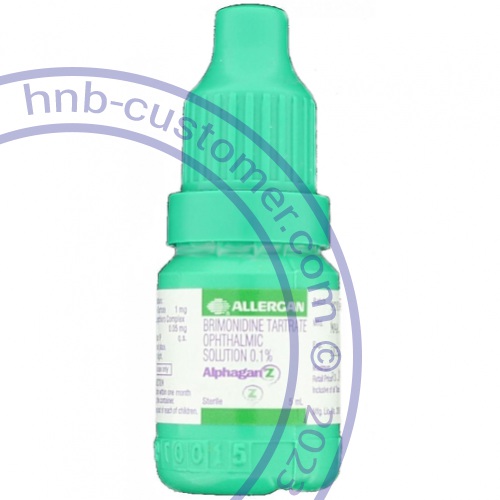

Brand(s):
- Alphagan Z
Manufacturer:
- Allergan / Plc
Disease(s):
- Open-angle Glaucoma / Ocular Hypertension
Known as:
- Luxfen / Alphagan
- We can ship our products to any location worldwide
- Enjoy complete anonymity and robust data security measures
- Exclusive certified products at compelling prices
- Skip the hassle of long queues; get your medicines hassle-free
Alphagan
brimonidine tartrate


Brand(s):
- Alphagan Z
Manufacturer:
- Allergan / Plc
Disease(s):
- Open-angle Glaucoma / Ocular Hypertension
Known as:
- Luxfen / Alphagan
Brimonidine Drops
What is Brimonidine Ophthalmic?
Brimonidine ophthalmic (eye drops) is a medication that works by reducing the amount of fluid in your eye. This, in turn, lowers the pressure inside your eye. It's primarily used to treat open-angle glaucoma and ocular hypertension (high eye pressure). While this information sheet provides helpful details, always consult your doctor or pharmacist for complete and up-to-date information.
Important Information for Your Doctor
Before using brimonidine ophthalmic, it's crucial to inform your healthcare professional about your medical history. This includes:
- Heart conditions: Congestive heart failure, coronary artery disease, history of stroke or blood clots.
- Circulation issues: Low blood pressure, circulation problems like Raynaud's syndrome.
- Mental health: History of depression.
- Allergies: Any known allergies, especially to brimonidine.
- Eye history: Pre-existing glaucoma or increased eye pressure.
Brimonidine ophthalmic is generally not recommended for children under 2 years old. Pregnant or breastfeeding individuals should discuss the use of this medication with their doctor. The FDA pregnancy category is B, indicating that studies have not shown a risk to the unborn baby, but it's always best to consult your healthcare provider.
How to Use Brimonidine Eye Drops
Always follow your doctor's instructions and the information on your prescription label. Never use more or less than prescribed, nor for a longer duration.
Here's how to apply the drops:
- Wash your hands thoroughly.
- Tilt your head back slightly and gently pull down your lower eyelid to create a small pocket.
- Hold the dropper above your eye, keeping the tip pointing downwards. Look upwards and away from the dropper and squeeze out one drop.
- Close your eyes for 2-3 minutes, keeping your head tilted down. Gently press your finger to the inside corner of your eye (near your nose) for about 1 minute to prevent the liquid from draining into your tear duct.
- If using more than one drop, wait about 5 minutes between drops.
- If using other eye drops, wait at least 5 minutes before applying them.
Avoid touching the dropper tip to your eye or any surface. Discard the bottle if the liquid changes color or contains particles. Notify your doctor of any eye injuries, infections, or upcoming surgeries, especially eye surgery.
Missed Dose
If you miss a dose, use it as soon as you remember, unless it's almost time for your next dose. Do not double the dose to make up for a missed one.
Potential Drug Interactions
Inform your doctor about all medications you are currently taking, including over-the-counter drugs, supplements, and herbal remedies. Brimonidine ophthalmic can interact with other medications, especially those that cause drowsiness or slow breathing. This includes, but is not limited to:
- Heart medications: Digoxin, digitalis, amlodipine, diltiazem, methyldopa, nifedipine, quinidine, verapamil, and others.
- Antidepressants: Amitriptyline, bupropion, clomipramine, desipramine, doxepin, duloxetine, fluoxetine, imipramine, nortriptyline, paroxetine.
- MAO inhibitors: Isocarboxazid, linezolid, phenelzine, rasagiline, selegiline, tranylcypromine.
This isn't an exhaustive list. It's crucial to provide your doctor with a complete medication history to prevent potential interactions.
Monitoring While Using Brimonidine
Brimonidine ophthalmic is not suitable for children under 2 years of age.
Possible Side Effects
Seek immediate medical attention if you experience an allergic reaction (hives, difficulty breathing, facial swelling). Contact your doctor promptly if you notice:
- Eye pain or increased watering.
- Severe swelling, redness, burning, or discomfort around your eye.
Common side effects can include:
- Drowsiness or fatigue.
- Dry mouth and blurred vision.
- Mild itching, redness, or irritation of the eyes.
- Mild stinging or burning upon application.
This list might not encompass all potential side effects. Consult your doctor or pharmacist if you have concerns.
Storage
Store brimonidine ophthalmic at room temperature, away from moisture and heat. Do not freeze. Keep the bottle tightly closed when not in use.
```









